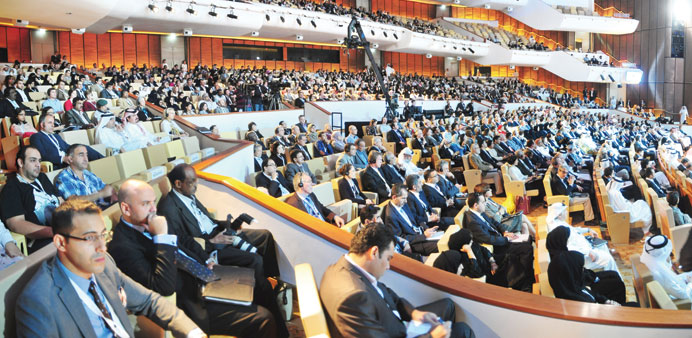By Joseph Varghese/Staff Reporter
The daily per capita consumption of water in Qatar is around 500 litres, said Dr Adil Sharif of the Qatar Environment and Energy Research Institute (QEERI) yesterday.
He was speaking at the plenary session on the second day of the Qatar Foundation Annual Research Forum 2013 at the Qatar National Convention Centre.
Sharif said that various conditions have resulted in the high water consumption in Qatar.
He said: “It is one of the highest consumption rates in the world. Quality of life, lifestyle and climatic conditions are the major reasons for the high use of water in Qatar.
It is four times higher than most European countries and 10 times higher than many other countries around the world.”
He added that in 2012, 59% of water was used for agriculture, 39% for domestic use, and 2% for industry in the country.
Sharif continued that present available technologies cannot increase the energy efficiency significantly and new methods are to be identified for better desalination process. “Current technologies are very costly and are affordable only to very rich countries. We need to look for methods that are energy-efficient, qualitative, cost-effective, environment-friendly, and sustainable.”
The official said that there was no possibility for any significant reduction in the use of water.
He observed: “Behavioural changes can reduce the use of water to a certain extent but we need better technologies for desalination which will benefit the world immensely. This can be through different research approaches using methods such as incremental development.”
Sharif observed that the QEERI was in the process of finding out better methods of desalination.
He elaborated: “Our vision is to solve tomorrow’s problems today through innovation. We need to adopt ‘step changes’ such as thinking out of the box, using new processes, novel technologies and new materials. This will help us find new solutions that will help not only Qatar but the entire world to come out of the water crisis.”
Sharif assured that by 2020, desalination and water purification technologies will contribute significantly to ensuring a safe, sustainable, affordable and adequate water supply for Qatar and the region.
Dr Ramamoorthy Ramesh of the US’s Oak Ridge National Laboratory explained how solar energy can be the major source of energy in the coming decades and how Qatar can benefit.
He said: “We need to use better technologies for the production of solar power. There is a need for new methods of storage. Solar panels have to be more user-friendly to become more popular.
“Cost-effectiveness is another fundamental driver for people to use it.”
Ramesh added that within a few years, solar energy will cost less than $1 per watt of energy.
Dr Farnam Jahanian of the US’s National Science Foundation spoke about the importance of cyber security and how it can be a fundamental challenge for Qatar’s cyber infrastructure.
He said that a secure and trustworthy computing system is an inevitable element for economic development of a country like Qatar.

The Qatar Foundation Annual Research Forum 2013 took place at the Qatar National Convention Centre.
